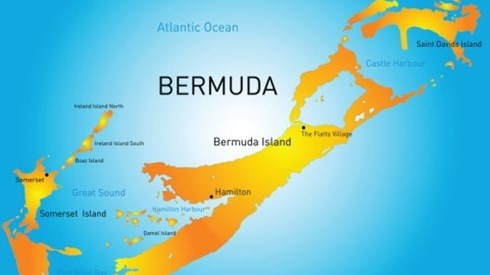Stress Testing Finds Bermuda Insurers Resilient to Adverse Events

January 23, 2023

Bermuda insurers saw both their gross loss exposure and gross potential loss value grow in 2021, according to a review by the Bermuda Monetary Authority (BMA).
In its Bermuda Insurance Property and Casualty Market Catastrophe Risk and Stress Testing Analysis 2021 Report, the BMA says that the gross loss exposure assumed by Bermuda insurers increased 8.03 percent in 2021 to $225.02 billion from $208.29 billion in 2020.
At the same time, the value of the gross estimated potential loss assumed by Bermuda insurers on major catastrophe perils increased from $193.10 billion in 2020 to $209.47 billion in 2021, an increase from 24 percent to 26 percent of the global share, according to the BMA.
Analysis showed Bermuda insurers more exposed to Atlantic hurricane than any other peril, the BMA report says. The gross averaged modeled hurricane losses across all companies ranged from $1.35 billion for 1-in-50-year events to $1.51 billion for 1-in-1,000-year events. The December 21, 2022, BMA report notes that the figures are an average, with variation among companies. Other perils showed lower modeled losses, with some variation between companies, the BMA says.
Gulf windstorm peril had both the highest gross and net loss exposure for Bermuda insurers with a gross loss impact of $30.02 billion and a net loss impact of $10.63 billion. San Francisco earthquake peril was next with a gross impact of $26.96 billion and a net impact of $9.16 billion, followed by Northeast hurricane with a $26.41 billion gross impact and a $10.87 billion net impact.
The BMA analysis found Bermuda insurers' use of reinsurance is widespread and is generally more pronounced for lower frequency return periods for the Atlantic hurricane and North American earthquake perils.
The BMA found that Bermuda insurers' ceded loss increased 7.03 percent from 2020 to 2021, from $131.83 billion to $141.10 billion. As a result, the net loss exposure of Bermuda insurers increased 9.76 percent, from $76.45 billion in 2020 to $83.92 billion in 2021.
The median insurer retains 43.4 percent of the exposure for 1-in-50-year events, and 53.7 percent of the exposure for 1-in-1,000-year events, the BMA report says.
The BMA found that Bermuda insurers use various reinsurance methods to cede a portion of their catastrophe exposures including traditional property catastrophe contracts, quota share contracts, insurance-linked securities protection, and industry loss warranty contracts.
The BMA report says that stress test results showed that the Bermuda insurance market is resilient to potential adverse impacts, including financial market, catastrophe, and other underwriting loss scenarios. "These results highlight the industry's overall resilience and establish the insurers' ability to absorb these unlikely and potentially large losses while still having capital remaining to settle policyholder obligations and meet regulatory capital requirements," the report says.
The BMA report says that given the Bermuda market's relatively high concentration of catastrophe risk, the BMA puts a priority on maintaining a broad understanding of the exposures, as well as the identification of any concentration of risk in Bermuda.
In a foreword to the report, Ricardo Garcia, managing director of the BMA, said that the assessment of catastrophe risk exposures and stress testing at both the micro and macro levels are fundamental to the BMA's overall supervisory framework. "Cat risk exposure assessment and stress testing allow the Authority to evaluate insurers' capital adequacy under adverse financial market and underwriting conditions," Mr. Garcia wrote. "The results of the assessment provide a comprehensive understanding of the sector's general vulnerability to shocks."
Mr. Garcia noted that the combined effects of a prolonged low interest rate period, the COVID-19 pandemic, and the Russia-Ukraine war have contributed to supply-driven increases in inflation. That inflation has subsequently resulted in monetary policy tightening in many economies, along with increased recession risk in many jurisdictions.
"Like other global hubs, Bermuda's international (re)insurance sector has not been immune to these developments," Mr. Garcia said. "Additionally, the increased frequency of cat events, among other related to climate change developments, has affected (re)insurers' strategies and outcomes."
The impact of those events has been an "earnings" event affecting Bermuda insurers' income statements rather than a "capital" event affecting their solvency positions, Mr. Garcia said. "Thus, overall, Bermuda insurers remain well capitalized to absorb any unlikely and potentially large losses, with capital remaining to settle policyholder obligations and meet regulatory capital requirements," Mr. Garcia wrote.
The report notes that stress testing is a valuable supervisory tool for the BMA as it offers a forward-looking perspective into the resilience of individual insurance entities as well as the entire sector.
"The main objective of stress testing is to assess capacity of individual insurers and the entire sector, to absorb the impact of various extreme, but not inconceivable, adverse events," the report says. "Stress testing can also be used to assess the effect of tail events beyond the measured level of confidence. Furthermore, the stress and scenario testing results help the Authority to identify any concentration of risk and new and/or emerging risks, as well as assessing how insurers are responding to such risks."
The report says that while the BMA does not use stress testing to determine required capital levels, it does help the authority determine whether the risk assumed by Bermuda insurers is appropriate for each insurer's risk appetite. Any capital adequacy concerns identified through the stress testing exercise are addressed as part of the BMA's normal supervisory routine.
January 23, 2023



